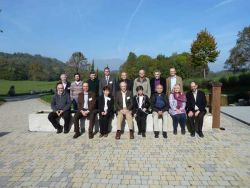The Biblical Institute St Andrew of Moscow in Bose
Bose, 21 October 2013
On 16–19 October an international colloquium on the theme “Ecumenical theology and hermeneutics” was held in Bose, organized by the Biblical-Theological Institute St Andrew of Moscow in collaboration with the community of Bose.
In the twentieth century the Christian Churches in various ways have sought ways to become closer to one another, so as to rediscover the unity the Lord desires. This has been marked by such important events as the founding of the World Council of Churches (Amsterdam 1948) and Vatican Council II.
The two-day seminar in Bose, in which participated theologians of various confessions active in the official dialogue between the Churches, as well as philosophers and historians, attempted to delineate the essential role of interpretation in ecumenical work, by presenting the results and the critical points as they are now of some important dialogues (between Catholics and Orthodox, Chalcedonian and Oriental Orthodox, Oriental Orthodox and Catholics, Baptists and Catholics).
Ecumenical dialogue is a patient exercise of listening to and understanding the other, which demands a rigorous study of church history, of church traditions, of cultural differences. The mystery of the Church’s catholicity and unity cannot be reduced to uniformity, but lives in incessant tension between diversity and communion.
The participants were: Alexei Bodrov, rector of the Biblical-Theological Institute St Andrew of Moscow and Michail Tolstoluzhenko of the same Institute; Frans Bouwen (Jerusalem); Theresia Hainthaler (Philosophisch-Theologische Hochschule Sankt Georgen, Frankfurt); archbishop Tadeusz Kondrusiewicz of Mink; Sergei Chursanov (St Tikhon’s Orthodox University, Moscow); Svetlana Konacheva (Russian State University for the Humanities, Moscow); Paul S. Fides University of Oxford); Paul L. Gavrilyuk (University of St Thomas, Saint Paul, Minnesota); Hanz Guttierez (Seminario Teologico Avventista Villa Aurora, Florence); Timothy M. Allen (University of St Andrews, Scotland); Edward Mahoney (Saint Michael’s College, Colchester, Vermont); Adalberto Mainardi (Bose); Drazko Dizdar and Christopher Brennan (Emmaus monastic community, Tasmania); Riccardo Burigana, director of the Centro Studi per l’Ecumenismo (Venice); Frederick Laritzen (Fondazione per le Scienze Religiose, Bologna); Katya Tolstaya, director of the Institute for Academic Study of Eastern Christianity).
